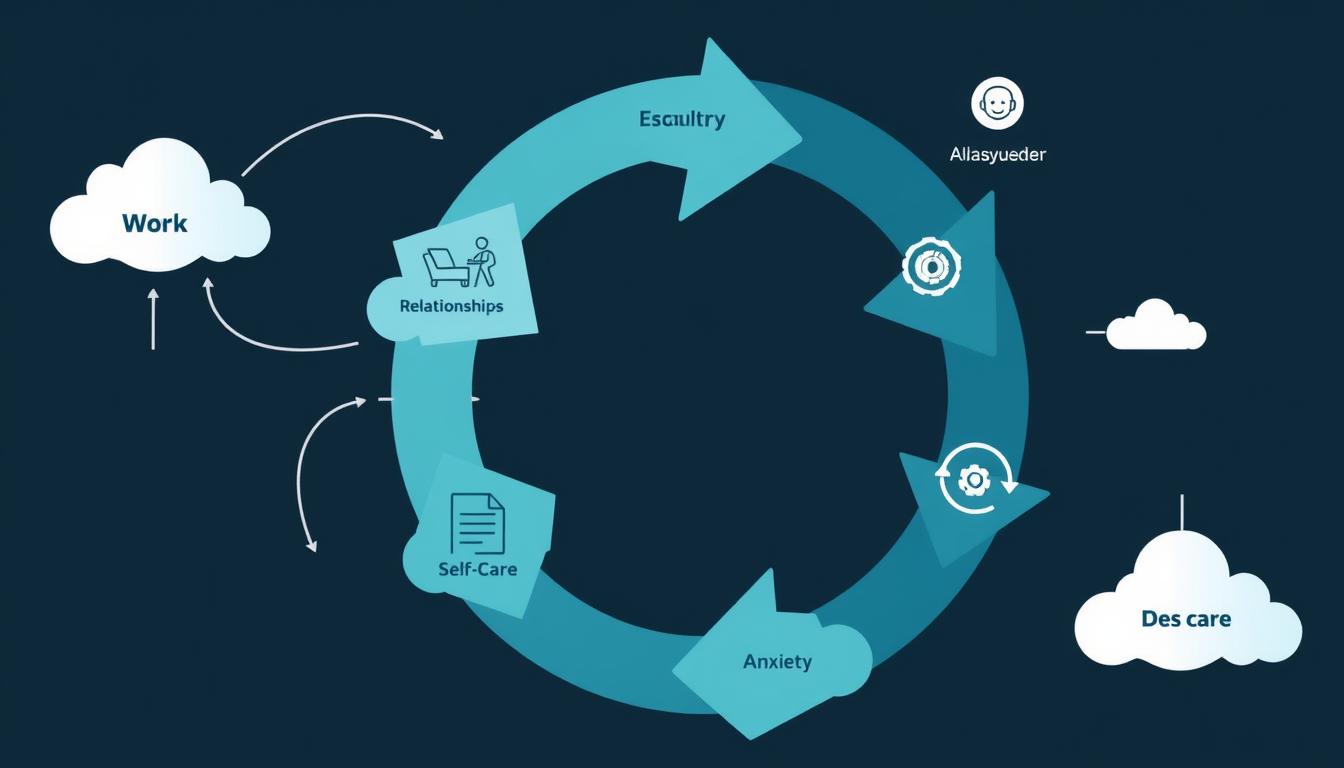What are stress cycles, and how do I break them?
Stress cycles are complex body responses that affect your mental health and emotional strength. They involve a series of reactions when you face stressors. These reactions trigger hormonal and brain changes1.
The stress response cycle has three main stages: alarm, resistance, and exhaustion1. In the alarm stage, your body releases cortisol and adrenaline. These hormones prep you for potential dangers1.
They boost blood sugar, give muscles energy, and speed up your heart rate1. Managing long-term stress is vital. Too much exposure can cause serious health issues1.
Stress cycles can greatly impact your overall health. They may lead to heart disease, diabetes, and immune system problems2. Spotting these patterns is crucial for creating good stress management plans3.
Key Takeaways
- Stress cycles involve complex physiological responses
- Three primary stages exist: alarm, resistance, and exhaustion
- Chronic stress can lead to serious health problems
- Hormones like cortisol play a significant role in stress responses
- Understanding stress cycles helps improve emotional resilience
Understanding Stress Cycles: What They Are and How They Work
Stress impacts your work-life balance and overall well-being. Your body responds to challenges through stress cycles. These cycles can affect your mental and physical health4.
Defining Stress Cycles
A stress cycle is your body’s natural response to threats or challenges. It triggers a complex physiological process. This process can impact your burnout prevention strategies4.
- Triggers body’s fight or flight mechanism
- Releases stress hormones like adrenaline and cortisol5
- Prepares body for immediate action
How Stress Cycles Affect You
Chronic stress can lead to serious health issues. Your body undergoes changes during prolonged stress periods4.
- Increased heart rate
- Muscle tension
- Heightened alertness5
“Understanding your stress cycle is the first step toward effective stress reduction.”
Signs You’re Stuck in a Stress Cycle
Recognizing a stress cycle is crucial for mental health. Common signs include4:
- Chronic fatigue
- Difficulty concentrating
- Increased irritability
- Weakened immune function5
Breaking the stress cycle requires proactive strategies. These include physical activity, deep breathing, and seeking social support5.
Understanding these cycles helps develop effective stress management techniques. This can improve your overall well-being.
Common Triggers of Stress Cycles
Knowing what causes stress is key to managing it well. Your stress triggers can be complex, affecting your emotional strength and overall health6.
Identifying Your Personal Triggers
Spotting your unique stress triggers is vital. It’s the first step to breaking harmful stress cycles. Stress can come from many places.
- Work-related pressures
- Financial concerns
- Relationship challenges
- Major life transitions
Environmental Factors Contributing to Stress
Your surroundings greatly affect your stress levels. Some places can cause lasting stress.
- Noisy or crowded spaces
- Chaotic living situations
- High-pressure work environments
“Stress is not what happens to you, but how you react to it.” – Hans Selye
The Role of Negative Thought Patterns
Negative thoughts can make stress worse. These include catastrophizing, harsh self-criticism, and constant worry6. Such thinking can weaken your immune system and disrupt your body’s functions7.
How you cope with stress is crucial. Building emotional strength helps you handle stressful situations better6.
Strategies to Break the Stress Cycle
Stress management involves caring for both mind and body. Breaking the stress cycle can boost your health and resilience8.
Mindfulness and Meditation Techniques
Mindfulness is key to reducing stress. The 4×4 deep breathing exercise helps your body feel safe9. Relaxation strategies can greatly improve your stress management skills10.
- Practice guided meditation
- Use body tensing and relaxation exercises
- Try brain dumping to declutter your mind
Developing Healthy Coping Mechanisms
Building strong coping strategies is vital for handling stress. The Nagoski sisters suggest several helpful practices8:
- Engage in physical exercise
- Connect with loved ones
- Allow yourself to rest without guilt
- Practice creative expression
*”Completing the stress cycle is about finding what works best for you”*
The Importance of Routine and Structure
A consistent routine can be a powerful mindfulness tool. The U.S. Department of Health recommends 150-300 minutes of moderate exercise weekly10.
Focus on activities that help process emotions and build connections9. Simple actions like hugging can provide quick stress relief.
Hugs release oxytocin, creating comfort. Studies show that 20-second hugs are especially beneficial8.
Seeking Support: When to Reach Out
Stress can be overwhelming, but you’re not alone. Recognizing when you need help is crucial for mental well-being. Seeking support shows strength and self-awareness in managing stress11.
Therapists offer specialized techniques to break stress cycles. Social support networks provide vital resources for emotional challenges12. If you’re facing persistent anxiety or mood swings, consider talking to a mental health professional11.
Family and friends can be powerful allies in stress management. Their support releases oxytocin, reducing stress and boosting safety feelings13. Support groups offer chances to share experiences and learn coping strategies12.
Your mental well-being is essential. Taking action through counseling or support groups can help restore balance. Remember, it’s okay to reach out for help when needed.
FAQ
What exactly are stress cycles?
How do I know if I’m stuck in a stress cycle?
What are the most common triggers of stress cycles?
How can I effectively break a stress cycle?
When should I seek professional help for managing stress?
Can mindfulness really help reduce stress?
How important is physical activity in managing stress cycles?
What role do social connections play in managing stress?
Can establishing routines help prevent stress cycles?
Are stress cycles the same for everyone?
Source Links
- Stress Cycle: How to Complete the Three Stages – https://greatist.com/health/stress-cycle
- Stuck in fight-or-flight mode? 5 ways to complete the ‘stress cycle’ and avoid burnout or depression – https://theconversation.com/stuck-in-fight-or-flight-mode-5-ways-to-complete-the-stress-cycle-and-avoid-burnout-or-depression-218599
- Completing the Stress Cycle: The Key to True Healing – https://cptsdfoundation.org/2024/07/08/completing-the-stress-cycle-the-key-to-true-healing/
- How To Identify Stress Cycles And Complete Them – https://www.thegoodtrade.com/features/stress-cycle-completion/
- Unraveling the Science Behind the Stress Response Cycle – https://simplish.co/blog/stress-response-cycle
- Stress Symptoms, Signs, and Causes – HelpGuide.org – https://www.helpguide.org/mental-health/stress/stress-symptoms-signs-and-causes
- What Is Stress? – https://my.clevelandclinic.org/health/diseases/11874-stress
- Stress Cycles: What They Are and How to Manage Them – https://teachingcommons.stanford.edu/news/stress-cycles-what-they-are-and-how-manage-them
- DC Bar – 7 Strategies to Complete the Stress Cycle – https://www.dcbar.org/news-events/publications/d-c-bar-blog/7-strategies-to-complete-the-stress-cycle
- How to Complete The Stress Response Cycle – https://psychcentral.com/stress/the-stress-response-cycle
- How to manage and reduce stress – https://www.mentalhealth.org.uk/explore-mental-health/publications/how-manage-and-reduce-stress
- Stress First Aid: A Practical Approach to Caring For Your Mental Health. – https://www.medstarhealth.org/blog/stress-first-aid-caring-for-your-mental-health
- When to Seek Help for Caregiver Stress and Burnout – Active Day – https://www.activeday.com/news/caregiver-stress-burnout/
news via inbox
Nulla turp dis cursus. Integer liberos euismod pretium faucibua








